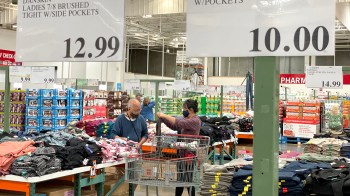Inflation, home prices go opposite ways
TEXT OF STORY
Kai Ryssdal: We were greeted this morning with a statistic known as the PPI — the producer price index. It measures what factories pay for the supplies they use to make the stuff consumers eventually buy.
According to the Department of Labor, inflation’s now rising the fastest it has since 1981, but housing prices continue to tumble.
An index from Standard & Poors reflecting December prices shows the steepest drop in the past 20 years.
Inflation, schminflation, right? We asked our New York bureau chief Jill Barshay to sort out the disconnect.
Jill Barshay: Sometimes it’s helpful to think of the economy as separate stores in a shopping mall.
Factory managers shop in the stores that sell raw materials. Right now, it seems there’s not enough of those basic goods to go around, but across the atrium at the housing store, there are way too many properties on the shelves and not enough shoppers.
Diane Swonk is the chief economist at Mesirow Financial.
Diane Swonk: We sort of have a tale of two economies going on. Commodity prices, food prices, oil prices, all the things that we seem to buy a lot of and don’t have a lot of choice in, continue to rise. At the same time, housing prices are coming down.
Swonk says it’s those rising commodity and energy prices that are really leading inflation. In other words, one or two stores in our imaginary shopping mall may be holding sales, but in most of our stores, goods are getting more expensive.
Mickey Levy is the chief economist at Bank of America. He says wholesale prices are rising alarmingly fast because of demand from places like China.
Levy says consumers shouldn’t worry too much. As the economy slows, shoppers will want to spend less, so it will be hard for businesses to pass on their higher production costs. Prices in the real stores, the ones you and I shop at, might not go up so much.
Mickey Levy: To me, it signifies a squeeze on business margins, more so than an ultimate increase in inflation in the consumer level.
That’s a glimmer of good news for Americans who can no longer count on their homes as a source of ready cash.
In New York, I’m Jill Barshay for Marketplace.
There’s a lot happening in the world. Through it all, Marketplace is here for you.
You rely on Marketplace to break down the world’s events and tell you how it affects you in a fact-based, approachable way. We rely on your financial support to keep making that possible.
Your donation today powers the independent journalism that you rely on. For just $5/month, you can help sustain Marketplace so we can keep reporting on the things that matter to you.


















